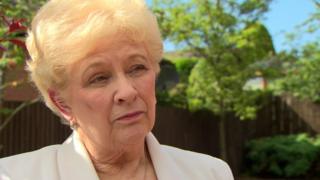Abortion clause will not work, says Baroness O'Loan

An attempt by MPs to liberalise abortion in Northern Ireland is "not workable" in its current form, Baroness Nuala O'Loan has said.
Last week, MPs voted to change Northern Ireland's abortion law and introduce same-sex marriage if devolution is not restored at Stormont by 21 October.
Baroness O'Loan said MPs had "hijacked" a Northern Ireland bill to push through changes without any consultation.
The amendments were "not formulated" in a way which could become law, she said.
"The clause which is currently in the bill does not work," the baroness told the BBC's Good Morning Ulster programme.
"It says the secretary of state must make regulations - the secretary of state can't."
The government has itself said the bill was not workable, she added, and it would be "wrong of the government to push it through in a situation where the people of Northern Ireland had no say".
She also pointed out that "100% of the Northern Ireland MPs who have taken their seat in Westminster voted against this".
Abortion is only available in very limited circumstances in Northern Ireland and same-sex marriage remains illegal.

Amendments aimed at changing the law on both issues were tabled by Labour MPs Stella Creasy and Conor McGinn.
Baroness O'Loan is campaigning against liberalising abortion and has written a joint letter to the prime minister objecting to the MPs' actions.
The letter states that the amendments were supported only by MPs "who do not represent constituencies in Northern Ireland" and claims they have treated local voters "with contempt".
Co-authored by the Church of Ireland Archbishop Lord Eames, the letter was handed out at Catholic church services across Northern Ireland on Sunday.
'Outside the purpose'
The baroness, who is a former police ombudsman, said the amendments could damage efforts to restore Northern Ireland's locally-elected government, which collapsed in January 2017.
"This was a bill that started its life in Parliament with the intention of allowing the secretary of state to postpone the date for an election... to enable the talks which are currently under way to restore the Northern Ireland Assembly to proceed," she said.
"What happened was it was hijacked in the Commons... various amendments were put in and these should not have been accepted because they were outside the purpose of the bill."
However, shadow Northern Ireland minister Karin Smyth, who supported the abortion amendment, told the same programme: "It is the right of members of Parliament to add amendments into legislation that comes forward, that is our job."
The Labour MP added that "human rights" could not be considered a "devolved matter".
"Up to a thousand women a year are travelling [for abortions], some in the most horrific circumstances; the most traumatic circumstances and having met and spoken to those women, as many members of Parliament have, we really are quite horrified that this cruelty for those women is continuing," Ms Smyth said.
The year before the Northern Ireland Assembly collapsed, MLAs voted against liberalising abortion even in some of the most difficult circumstances.
Last Wednesday in the House of Lords, the Northern Ireland (Executive Formation) Bill was moved on behalf of the government by parliamentary under-secretary of state at the Northern Ireland Office, Lord Duncan of Springbank.
He told peers that the bill had been amended in the Commons to "oblige the government to introduce regulations to provide for same-sex marriage and abortion".
But before he commended the bill to the Lords, he pointed out: "Crucially, the amendments as drafted do not function properly and so do not enable the government to deliver on the instruction of Parliament.
"I have just met Conor McGinn and Stella Creasy to discuss how best to take this forward and to ensure that the changes agreed by the Commons can be delivered."